
The Wytches
The Wytches have applied their musical alchemy to crafting songs that are doomy, dangerous and more than a little infectious
![]() righton-based surf-grunge trio The Wytches are the product of relocation, from the suffocating enclosure that they saw in Peterborough to traditional musical hotbed Brighton. Having been born from the ashes of The Crooked Can, a band that featured the talents of guitarist, vocalist and primary songwriter Kristian Bell and drummer Gianni Honey, the move to Brighton saw Daniel Rumsey answer Kristian and Gianni’s advert for a bassist.
righton-based surf-grunge trio The Wytches are the product of relocation, from the suffocating enclosure that they saw in Peterborough to traditional musical hotbed Brighton. Having been born from the ashes of The Crooked Can, a band that featured the talents of guitarist, vocalist and primary songwriter Kristian Bell and drummer Gianni Honey, the move to Brighton saw Daniel Rumsey answer Kristian and Gianni’s advert for a bassist.
Since then the three-piece have gone from strength to strength, featuring in The Guardian’s New Band of The Day and NME’s Radar Band of the Week. With a clutch of singles under their belt already – including Robe For Juda, a runner-up for our ‘Best Rock Song of 2014’ award – their doomy surf-grunge has drawn favourable comparisons to Bleach-era Nirvana, with a dash of Ty Segall-esque garage psych thrown in for good measure. An album has been recorded, with expectant fans able to get their hands on it this August.
Songwriting was fortunate enough to catch up with them and learn that, collectively, the influence of Slipknot fuels their songwriting…
 Tell us about your background and how you came to be The Wytches…
Tell us about your background and how you came to be The Wytches…
Kristian: “I played as a drummer in hardcore bands and then I started singing in a band with Gianni, which was the first time I’d really written songs. Then we both moved to Brighton and I’d written loads of stuff with another band, which then became The Wytches.”
Gianni: “Kristian and I just wanted to get out of Peterborough. It’s a very enclosed scene there. We don’t like London very much, so we chose to move to Brighton.”
Dan: “I’m from Bournemouth and I decided to try and make something of my music career. So I took my songs to Brighton. While there I answered a poster that had been put up by these guys, to be in The Wytches, and I just ended up being more busy with these guys.”
Being in Brighton, do you consider yourself part of any scene there, or do you see yourselves as separate?
K: “It’s easy to say that we’re on the same level as all the hyped bands because in a publicity sense we are, we’re on the same blogs and stuff. But I don’t think we’re really part of any scene there. We’re not really a psych band.”
D: “I wouldn’t say we’ve ever been part of a scene in Brighton. We’ve just done our own thing a lot of the time. It seems a bit of a trap to be part of a scene: if you’re in a scene then you’re just stuck in that scene.”
G: “We’re too busy to be in a scene. We just work hard and keep on trucking.”
K: “We’d get put on the same bill as other bands, but we didn’t try to use other bands to try and get favour ourselves.”
“People record a demo and think Glastonbury is the next step”
What bands have you toured with and what have you learned from them?
K: “We toured with METZ. From them we learned not to take ourselves too seriously. They cope with the stress and rigours of touring very well.”
G: “Their work rate is incredible. We played with them in January (2013) and then again in November and December and they’d been on tour the whole time. We come from a place where people record a demo and think Glastonbury is the next step. Some bands get all starry-eyed and don’t see the bit in-between.”
Do you have a set process for recording?
K: “I used to record drums first and I would record a structure of various beats on top of it and I always had notebooks full of lyrics. These days I sit down and play guitar and write that way. I don’t see them as band songs. I once read that if you can sing or hum the melody and it sounds good without the instruments behind it, that’s when you have a good song.
“It varies how I write though, I never look upon it as a 9-to-5 thing and think, ‘It’s 9 o’clock, now I need to sit down and write a song’.”
Does how you record your songs have an impact on your songwriting, whether it’s lo or hi-fi?
K: “I’ve always recorded lo-fi. I’ve never recorded in studio quality. Recording lo-fi does help though, because what I’ll normally do is record a song and then present it to these guys and if it was recorded it a high quality then we wouldn’t be able to make the songs sound as good. It also helps because you feel happy to play the songs a bit looser, a bit trashier. We practise a lot, so we’d like to think we’re quite tight.”
G: “Kristian will record some demos and then we might record them somewhere different, but we always end up going back to the demos.”
K: “We were trying out some digital places when we were thinking about recording an album, but we didn’t really enjoy recording digitally.”
G: “That’s why we went to Toe Rag [an analogue recording studio in Hackney, London]. There’s not even a computer in the recording studio.”
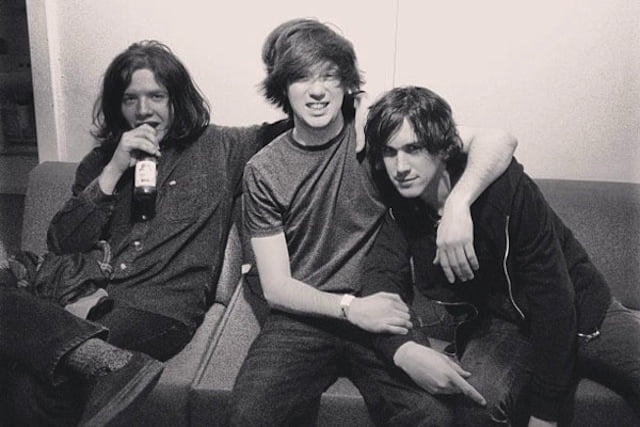
Individually and collectively, which musicians are you most inspired by?
K: “Elliott Smith. My favourite song’s Waltz #1. I wasn’t mad on him when I started but I now I really love him.”
D: “I like Nick Cave. I got into him in the last year or two and he really inspires my writing. He’s quite cool and has a real presence about him. I really like The Boatman’s Call – I prefer the softer, rather than the trashier side of him.”
G: “Drum-wise, I’d say people who are simple. I don’t like drumming that’s unnecessarily over the top. In terms of influence upon how I write music though, I would say Daniel Johnson, his music just sounds punk.”
All: “Slipknot.”
“I’ve been writing on piano. I can’t really play piano, which weirdly helps”
Do you have an instrument of choice for writing music on?
K: “I have two classical guitars that I write on, a really big one and a small one. The small one is good for writing really intricate parts on. I have a church organ, too, that I write on. It looks a bit like an upright piano.”
D: “I also write mostly on acoustic guitar, although I have found recently that it’s been quite limiting, as though I’ve exhausted its songwriting prowess. So I’ve been writing recently on piano. I can’t really play piano, which weirdly helps; because I don’t know too much I can be experimental.”
G: “I’m in another band, an indie band, in which I play drums and sing. I just get hammered and we think about how to make noise.”
Can we expect an album soon?
K: “We’ve recorded the album. We recorded it in mid-October and were going to put it out in February, which then turned to May and has now turned to August.”
Does spontaneity enter into your songwriting process?
D: “When we started we would play a new song in every rehearsal. We took a few risks with that because if we had a gig the next day we would play the new song. That was something I was scared by but Gianni and Christian were keen to do that.”
K: “It’s sad to think that the days are gone when nobody gave a shit about what you did and you could do whatever you wanted, when playing a gig. We feel now though if we want to do something spontaneous then some guy reviewing the gig will pick up on it and slate you for it.”
Interview: Damien Girling
Gravedweller is available as a free download through Heavenly Recordings and you can hear more by The Wytches at their Soundcloud page




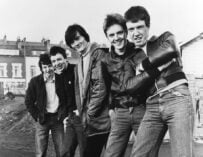
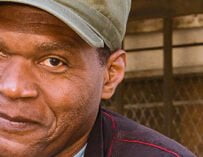


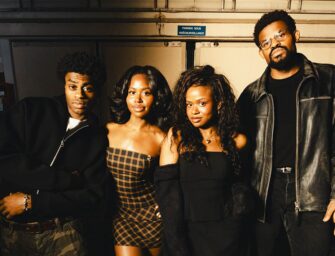


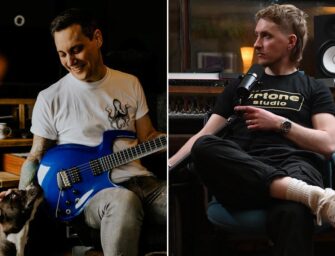






















Related Articles